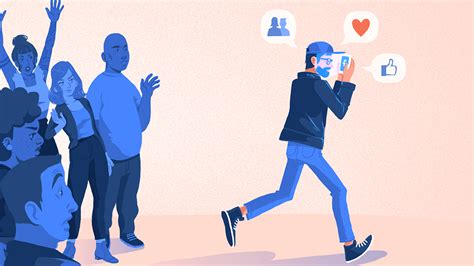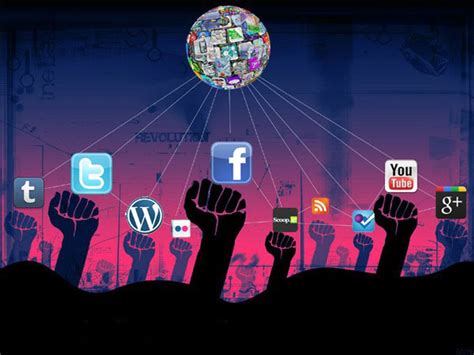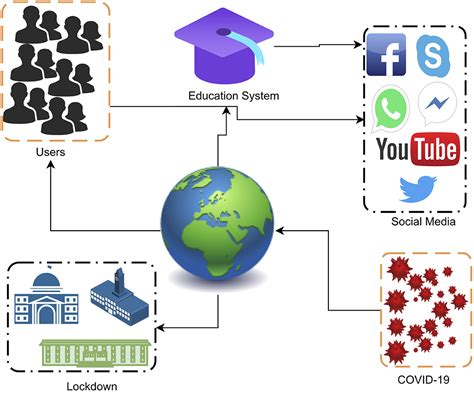Within the fast-paced and ever-evolving landscape of contemporary society, an unprecedented phenomenon has emerged, igniting a profound transformation in the way we connect, communicate, and form relationships. Unleashing an intangible force that transcends geographical barriers, social media platforms have become the catalysts of a paradigm shift, revolutionizing the very fabric of human interaction.
Embracing the boundless potential of the digital realm, individuals are now able to cultivate personal connections on a scale unparalleled in human history. With a mere flick of a finger, one can traverse borders, cultures, and languages to share thoughts, emotions, and experiences with individuals from all walks of life. At the heart of this societal revolution lies the power of social media, ushering in a new era defined by virtual connections that defy time and distance.
Through the medium of these expansive online networks, individuals have unearthed an extraordinary opportunity to shape their identities, forge alliances, and amplify their voices. Empowering both the seen and the unseen, these platforms transcend the boundaries of traditional communication, allowing users to project their beliefs, ideals, and vulnerabilities with unparalleled authenticity. By granting a virtual canvas upon which one can freely express themselves, social media grants unprecedented agency to individuals, saving them from the constraints imposed by physical environments.
Changing Communication Dynamics: The Influence of Social Media on Interpersonal Relationships

In today's ever-evolving digital landscape, social media has revolutionized the way individuals connect and interact with one another. The rise of various online platforms has had a profound effect on the dynamics of communication and has significantly impacted interpersonal relationships. Through the power of instant messaging, virtual communities, and online networks, social media has become a driving force in reshaping the way we relate to others.
- Shaping Identity: Social media platforms provide individuals with an opportunity to create and curate their digital presence, shaping their identity in the eyes of others. Through carefully chosen profile pictures, status updates, and shared content, people can portray themselves in a desired light. This ability to construct an online persona can influence how individuals are perceived and can forge new connections or deepen existing relationships.
- Expanding Social Circles: One of the notable impacts of social media on interpersonal relationships is its ability to expand social circles beyond geographic boundaries. Through online networks, individuals can connect with like-minded people or seek out communities of interest. This broadening of social circles allows for the exploration of diverse perspectives, the exchange of ideas, and the potential for new friendships or professional connections.
- Fostering Communication Accessibility: With social media, communication has become more accessible and convenient. The ease and speed of sending messages, sharing updates, or engaging in real-time conversations have transformed the way individuals stay connected with their friends, families, and acquaintances. Distance is no longer a significant barrier, enabling constant communication and fostering a sense of closeness even in the absence of physical proximity.
- Altering Communication Styles: Social media's influence on interpersonal relationships can also be seen in the way people communicate. The use of emojis, gifs, and shorthand language has become commonplace, allowing for more expressive and concise messaging. However, these changes in communication styles can also present challenges, as the nuances and emotions conveyed through face-to-face interactions may be lost or misconstrued in the digital realm.
- Navigating Privacy and Trust: The prevalence of social media brings with it a range of privacy and trust considerations in interpersonal relationships. Individuals must navigate the delicate balance between sharing personal information and maintaining their privacy. The transparency of online profiles and the potential for online harassment or deception can impact trust levels, requiring individuals to be cautious and discerning in their online interactions.
In conclusion, social media's impact on interpersonal relationships cannot be overlooked. It has not only changed the way we communicate but has also influenced how we present ourselves, broaden our social circles, and navigate the complexities of trust and privacy. As we continue to unlock the power of digital connections, it is crucial to understand and adapt to the evolving dynamics of communication in the age of social media.
Nurturing Global Communities: The Role of Social Channels in Connecting Individuals across Borders
In this segment, we delve into the profound impact of social channels in fostering meaningful connections among individuals, transcending geographical boundaries and facilitating the emergence of global communities. Through embracing digital platforms, people from diverse cultures, lifestyles, and backgrounds can effortlessly come together to establish connections based on mutual interests, shared experiences, and common passions.
Creating a sense of belonging
Online platforms provide a unique opportunity for individuals around the world to connect and find their tribe. By cultivating virtual communities, social media enables individuals to feel a sense of belonging and forge deep connections with others who share similar viewpoints, interests, and values. Through the power of digital connectivity, individuals can break down the barriers of distance and establish connections that transcend physical limitations.
Inclusive spaces for collaboration and knowledge exchange
Through social media platforms, individuals have access to a vast array of information, expertise, and resources from around the globe. Online communities offer a space for collaboration, enabling individuals to engage in meaningful conversations, share knowledge, and learn from one another. This decentralized exchange of ideas fosters innovation, cultural understanding, and personal growth, further strengthening the ties that bind multicultural societies.
Igniting empathy and cultural appreciation
The global reach of social media allows individuals to gain insights into different cultures, traditions, and perspectives, promoting empathy and understanding. By engaging with individuals from diverse backgrounds, individuals can expand their horizons, challenge their own biases, and foster a greater appreciation for cultural diversity. Social media cultivates a climate of acceptance and respect, ultimately fostering a more inclusive and harmonious global society.
Promoting social activism and global citizenship
Social media has become a powerful tool for social activism, empowering individuals to voice their thoughts, advocate for change, and address pressing societal issues on a global scale. Through viral campaigns, hashtags, and online petitions, social channels unite individuals across borders, mobilizing collective action and raising awareness about critical topics such as human rights, climate change, and social equity.
In conclusion, social media plays a pivotal role in nurturing global communities by connecting individuals worldwide, fostering inclusivity and collaboration, promoting empathy, and empowering individuals to become global citizens actively engaged in shaping the future of our world.
Revolutionizing Activism: Empowering Social and Political Movements through the Digital Sphere

In this digital era, the rise of online platforms has redefined the landscape of activism, granting individuals and communities unprecedented opportunities to express their concerns, raise awareness, and mobilize for social and political change. Harnessing the power of social media, people are now able to connect with like-minded individuals on a global scale, breaking down barriers and revolutionizing the way in which activism operates.
Through the utilization of diverse online tools and platforms, social and political movements have been able to amplify their voices, engage with a wider audience, and bring attention to pressing issues and injustices. These digital connections have created virtual spaces where individuals can share their stories, exchange ideas, and collaborate towards creating grassroots movements with a far-reaching impact.
- Strengthening Grassroots Movements: The digital sphere has empowered activism by providing a virtual platform for organizing and mobilizing grassroots movements. Through social media platforms, individuals can create online communities and support networks, allowing them to reach a global audience and garner support for their cause.
- Amplifying marginalized voices: Social media has played a vital role in amplifying the voices of marginalized communities, who often face barriers to traditional forms of activism. By sharing their experiences and raising awareness, these individuals have been able to challenge societal norms and demand justice.
- Rapid dissemination of information: Social media platforms have enabled the rapid dissemination of information, breaking down the barriers of time and distance. This instant connectivity allows for real-time updates, facilitating coordinated efforts and ensuring that movements remain agile and adaptable.
- Global solidarity and collaboration: Through social media platforms, activists can connect with individuals and organizations across geographical boundaries. This global solidarity provides an opportunity for collaboration, sharing resources, and learning from diverse perspectives, ultimately strengthening the impact of social and political movements.
- Engaging the youth: Social media has become an influential tool in engaging and mobilizing younger generations towards social and political activism. Its accessibility and widespread use among young people have allowed for increased participation, empowering them to drive meaningful change.
As social media continues to evolve, its potential to revolutionize activism remains vast. By leveraging digital connections and embracing new online tools, social and political movements can continue to empower individuals, foster solidarity, and drive transformative change in the modern world.
Understanding the Effect on Mental Wellness: Exploring the Link Between Social Networking Platforms and Personal Well-being
Within the realm of digital technology, virtual platforms have become an inextricable part of our daily lives, allowing us to connect and interact with others in ways that were unimaginable in the past. However, as these technological advancements continue to evolve, questions arise about the potential impact they may have on our mental health and overall well-being.
One area of concern is the influence of social networking platforms, which have rapidly grown in popularity and adoption. These platforms, which enable individuals to create and maintain online profiles, connect with others, and share content, have given rise to new modes of communication and social interaction. However, the effect of these platforms on mental health and well-being remains a complex and multifaceted issue.
- Relationship between social media usage and feelings of loneliness
- Effects of social comparison and self-esteem on mental well-being
- The role of online social support networks and mental health outcomes
- Potential consequences of excessive social media consumption on addictive behaviors
One aspect to consider is the potential link between social media usage and feelings of loneliness. While these platforms allow individuals to connect with others and access a vast network of relationships, research suggests that excessive use of social media may actually increase feelings of isolation and loneliness. By comparing their own lives to the curated and often idealized representations of others, individuals may experience a sense of inadequacy and disconnection from their own reality.
In addition, the impact of social comparison and self-esteem on mental well-being is a crucial factor to explore. Social media platforms often encourage users to showcase their highlights and achievements, leading to a constant stream of comparisons that can fuel feelings of inadequacy and low self-worth. Understanding how these comparisons impact mental health is essential in assessing the overall effect of social media on individuals' well-being.
Moreover, the emergence of online social support networks poses both potential benefits and drawbacks for mental health outcomes. While these platforms can provide a sense of community and emotional support, they may also contribute to the propagation of harmful or misleading information. Exploring the role of online social support and its effects on mental wellness is critical to fully understand the impact of social media on individuals' psychological state.
Finally, the potential consequences of excessive social media consumption on addictive behaviors cannot be overlooked. Research has suggested that repetitive and excessive use of these platforms can lead to addictive behaviors similar to substance abuse. Understanding the psychological effects of social media addiction and developing strategies for maintaining a healthy relationship with these platforms are essential in promoting mental well-being in the digital age.
In summary, comprehending the intricate relationship between social media usage and mental well-being is vital in assessing the impact of these virtual platforms on individuals' psychological state. By exploring the potential effects on loneliness, social comparison, self-esteem, online social support networks, and addictive behaviors, we can gain valuable insights into the complex interplay between social media and mental health.
Reshaping Business Landscape: Leveraging Social Media for Marketing and Branding Strategies

In today's interconnected world, the ever-evolving realm of social media has brought about a paradigm shift in the way businesses operate. Harnessing the immense potential of digital platforms for marketing and branding strategies has become imperative for thriving in the competitive business landscape.
Social media, with its interactive and dynamic nature, offers businesses unparalleled opportunities to establish strong brand identities, engage with target audiences, and drive impactful marketing campaigns. With a vast array of platforms like Facebook, Twitter, Instagram, LinkedIn, and YouTube, businesses can leverage the power of social media to amplify their reach and connect with potential customers on a global scale.
One of the key benefits of social media for marketing and branding is the ability to create authentic and genuine connections with customers. By incorporating compelling storytelling, businesses can evoke emotions and build meaningful relationships with their target audience. These connections go beyond mere transactions, fostering loyalty and advocacy that can significantly impact a brand's reputation and success.
In addition, social media provides businesses with valuable insights into consumer behaviors, preferences, and trends. A well-crafted social media strategy allows companies to monitor conversations, gather feedback, and adapt their marketing approaches accordingly. This real-time data enables businesses to make informed decisions, optimize their efforts, and stay ahead of the competition.
Moreover, social media serves as a powerful tool for promoting products and services, raising brand awareness, and driving customer engagement. By creating visually appealing and shareable content, businesses can tap into the viral nature of social media and garner widespread attention. Influencer partnerships, user-generated content, and interactive campaigns further enhance brand visibility and generate buzz.
However, it is important for businesses to approach social media marketing and branding strategies with care and consideration. While the potential benefits are immense, the landscape is also fraught with challenges. Maintaining a consistent brand voice, managing online reputation, and navigating the ever-changing algorithms and trends require vigilance and adaptability.
In conclusion, social media has revolutionized the business landscape, providing endless possibilities for marketing and branding. By leveraging the power of these digital platforms, businesses can reshape their strategies, connect with their audience on a deeper level, and establish a strong competitive advantage in the modern era of digital connections.
The Dark Side of Online Interactions: Tackling the Menace of Cyberbullying and Online Harassment
With the widespread adoption of digital platforms and the proliferation of internet connectivity, the virtual world has become an intricate part of our lives. However, this digital landscape also harbors a sinister aspect that cannot be overlooked. The online sphere is plagued with rampant cyberbullying and online harassment, creating an environment that is toxic, distressing, and harmful.
When individuals employ technology to intimidate, threaten, or demean others, it leads to the emergence of cyberbullying. In this form of harassment, perpetrators utilize different social media platforms to publicly shame or humiliate their victims, leaving them vulnerable and feeling isolated. Cyberbullying manifests in various ways, including hateful comments, targeted attacks, spreading false information, or even impersonating others with malicious intent. The repercussions extend beyond the virtual realm, causing severe psychological trauma and impacting the well-being of the victims.
- Online harassment, on the other hand, encompasses a broader range of abusive behaviors that individuals experience in the digital space. It includes cyberstalking, doxxing, revenge pornography, and other invasive actions that violate privacy and dignity. Perpetrators of online harassment often use anonymity as a shield, making it even more insidious and difficult to combat.
- The victims of cyberbullying and online harassment endure immense emotional distress, which can lead to a significant decline in mental health, self-esteem issues, and even self-harm in extreme cases. The consequences are far-reaching, affecting not only the victims but also their families, friends, and communities.
- The effects of cyberbullying and online harassment are especially damaging among vulnerable populations such as children and teenagers who are more susceptible to these attacks. The lifelong impact on their mental and emotional development cannot be emphasized enough.
Addressing these serious issues necessitates a multidimensional approach involving internet regulations, social media platforms, educational institutions, and communities at large. Law enforcement agencies must have stringent measures in place to identify and prosecute offenders. Social media platforms should prioritize user safety and actively monitor and moderate online content to swiftly remove hateful and harassing material.
Moreover, educational programs and campaigns are imperative for raising awareness about the implications of cyberbullying and online harassment, fostering empathy, and fostering digital citizenship. By encouraging responsible online behavior and promoting kindness and respect, we can create a safer and more inclusive digital environment for all.
Empowering Education: Utilizing Social Platforms for Learning and Collaborative Purposes

In today's interconnected world, the emergence of various digital platforms has revolutionized the way we perceive education. When it comes to enhancing the learning experience, social media has emerged as a powerful tool that fosters collaboration, encourages knowledge-sharing, and provides limitless opportunities for educational growth.
Creating Active Learning Environments
Social media platforms provide a dynamic and engaging space where students and educators can actively participate in the learning process. By utilizing these platforms, students can interact with their peers, ask questions, share ideas and resources, and engage in discussions that deepen their understanding of the subject matter. This collaborative nature of social media encourages active learning, promoting critical thinking skills and enhancing overall educational outcomes.
Fostering Global Connections
Through social media, geographical barriers are no longer limitations to education. Students and educators from different corners of the world can connect and exchange knowledge effortlessly. By harnessing the power of social media, individuals can tap into a global network of experts, accessing diverse perspectives and insights. This exposure to a broad range of ideas and cultures enriches the learning experience and prepares students for the globalized world they will inevitably navigate.
Facilitating Continuous Learning Opportunities
Social media allows learners to access educational resources beyond the traditional classroom setting at any time and from anywhere. Platforms like blogs, podcasts, and online forums enable students to explore topics of interest and engage with educational content tailored to their unique learning style. As a result, social media serves as a catalyst for continuous learning, offering a plethora of opportunities for personal and professional development.
In conclusion, social media, as a valuable educational tool, holds immense potential in transforming the way we learn and collaborate. By leveraging the capabilities of these platforms, educators and students can create interactive and inclusive learning environments, connect with individuals worldwide, and engage in lifelong learning journeys.
FAQ
What is the main focus of the article "The Impact of Social Media on Modern Society: Unlocking the Power of Digital Connections"?
The main focus of the article is to analyze and discuss the influence of social media on contemporary society, highlighting its ability to facilitate digital connections.
What are some positive impacts of social media on modern society?
There are several positive impacts of social media on modern society. It allows individuals to connect and communicate with people from around the world, promotes the dissemination of information and ideas, and provides a platform for raising awareness about social issues.
How has social media changed the way people interact and communicate?
Social media has revolutionized the way people interact and communicate. It has facilitated instant communication, allowing individuals to connect with others in real-time regardless of their physical location. Additionally, it has expanded the scope of communication, enabling people to engage with larger audiences and share their thoughts and experiences on a global scale.
What are some negative consequences of social media in modern society?
While social media has numerous benefits, it also has some negative consequences. It can contribute to feelings of isolation and loneliness, as people may prioritize virtual interactions over face-to-face connections. It can also lead to addiction, cyberbullying, loss of privacy, and the spread of false information.
How do social media platforms impact businesses and marketing strategies?
Social media platforms have greatly impacted businesses and marketing strategies. They provide opportunities for increased brand visibility, targeted advertising, and direct customer engagement. By leveraging the power of social media, businesses can reach a larger audience, build brand loyalty, and generate sales.



